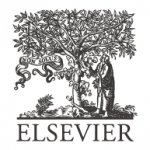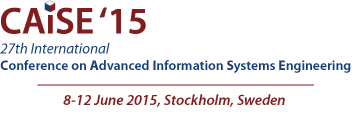Theme:
Creativity, Ability and Integrity in information Systems Engineering
Information systems engineering is a discipline focused on the design of artifacts that can extend the boundaries of human and organizational capabilities. So far, most work within information systems engineering has focused on the science component with major contributions in areas ranging from data mining techniques to participative enterprise modeling methods. However, systems are moving beyond traditional information management and need to organically blend into the environment, appealing to large and diverse user bases. Creativity, Ability, and Integrity are some important components not well covered. Creativity is becoming ever more important as Information Systems are designed in novel and unexpected ways making use of information from different sources that need to be merged and molded to become meaningful and valuable. Ability enables systems to be capable to deliver business in excellent, competitive and agile way. The task of Integrity is to ensure quality in ethical codes – modifications by authorized parties, or only in authorized ways. Success in this endeavor requires methods not only based on scientific rigor but also innovating solutions beyond the state of the art.
CAiSE welcomes all submissions that fall in the domain of information systems engineering. This year, the conference extends a special welcome to innovative papers that address conference’s theme. Four kinds of contributions are accepted: technical papers, empirical evaluation papers, reports of experience, and exploratory papers. The CAiSE topics of interest include, but are not restricted to:
New Generation IS Engineering
- Context-aware and adaptive management
- Agile enterprise models and architecture
- Distributed, mobile and open architecture
- IS for collaboration
- Social computing
- High volume and complex information management
- Open data management
- Inventive quality of IS models and design
- IS for idea flow
- Visualization in IS
- Intelligent, sustainable and viable IS
- Service science and innovation
- Ergonomic architectures and design
Models, Methods and Techniques in IS Engineering
- Conceptual modeling, languages and design
- Requirements engineering
- Business process modeling, analysis, and engineering
- Models and methods for evolution and reuse
- Domain engineering methods for networked & virtual organizations
- Mining, monitoring, and predicting
- Variability and configuration matching
- Compliance and alignment handling
- Method engineering
Architectures and Platforms in and for IS Engineering
- Cloud-based IS engineering
- Service oriented engineering
- Multi-agent engineering
- Multiplatform IS engineering
- Integrated architectures and virtualization
Domain Specific IS Engineering
- IT governance
- eGovernment and public sector
- Intellectual heritage
- City management
- Industrial ecology management
- IS for healthcare
- Educational IS
- Value and supply chain management
Multi-aspect IS
- Sustainability and social responsibility management
- Enterprise capability management
- Decision support
- Security and safety management
- Data and knowledge intelligence
- Workflow management
- ERP and COTS
- Content management and semantic Web
Important Dates
- Paper submission deadline:
1st December 20148th December 2014
- Notification of acceptance: 10th February 2015
- Camera-ready of all papers: 20th March 2015
Author Guidelines
Types of contributions
We invite four types of original and scientific papers:
- Formal and/or technical papers describe original solutions (theoretical, methodological or conceptual) in the field of IS engineering. A technical paper should clearly describe the situation or problem tackled, the relevant state of the art, the position or solution suggested and the potential – or, even better, the evaluated – benefits of the contribution.
- Empirical evaluation papers evaluate existing problem situations or validate proposed solutions with scientific means, i.e. by empirical studies, experiments, case studies, simulations, formal analyses, mathematical proofs, etc. Scientific reflection on problems and practices in industry also falls into this category. The topic of the evaluation presented in the paper as well as its causal or logical properties must be clearly stated. The research method must be sound and appropriate.
- Experience papers present problems or challenges encountered in practice, relate success and failure stories, or report on industrial practice. The focus is on ‘what’ and on lessons learned, not on an in-depth analysis of ‘why’. The practice must be clearly described and its context must be given. Readers should be able to draw conclusions for their own practice.
- Exploratory Papers can describe completely new research positions or approaches, in order to face to a generic situation arising because of new ICT tools or new kinds of activities or new IS challenges. They must describe precisely the situation and demonstrate how current methods, tools, ways of reasoning, or meta-models are inadequate. They must rigorously present their approach and demonstrate its pertinence and correctness to addressing the identified situation.
Submission Conditions
Papers should be submitted in PDF format. The results described must be unpublished and must not be under review elsewhere. Submissions must conform to Springer’s LNCS format and should not exceed 15 pages, including all text, figures, references and appendices. Submissions not conforming to the LNCS format, exceeding 15 pages, or being obviously out of the scope of the conference, will be rejected without review. Information about the Springer LNCS format can be found at http://www.springer.de/comp/lncs/authors.html. Three to five keywords characterizing the paper should be indicated at the end of the abstract. The type of paper (technical/empirical evaluation/experience/exploratory paper) should be indicated in the submission.
Submission is done through CyberChair at the following page: http://cyberchairpro.borbala.net/caisepapers/submit/
Publication
 Accepted papers will be presented at CAiSE15 and published in the conference proceedings, which is published in the Springer Lecture Notes in Computer Science (LNCS). Authors elected best papers from the conference will be invited to submit an expanded version for publication in the journal, Information Systems.
Accepted papers will be presented at CAiSE15 and published in the conference proceedings, which is published in the Springer Lecture Notes in Computer Science (LNCS). Authors elected best papers from the conference will be invited to submit an expanded version for publication in the journal, Information Systems.
 Authors selected for best papers from the conference will be invited to submit an expanded version for publication in the Information Systems journal.
Authors selected for best papers from the conference will be invited to submit an expanded version for publication in the Information Systems journal.






